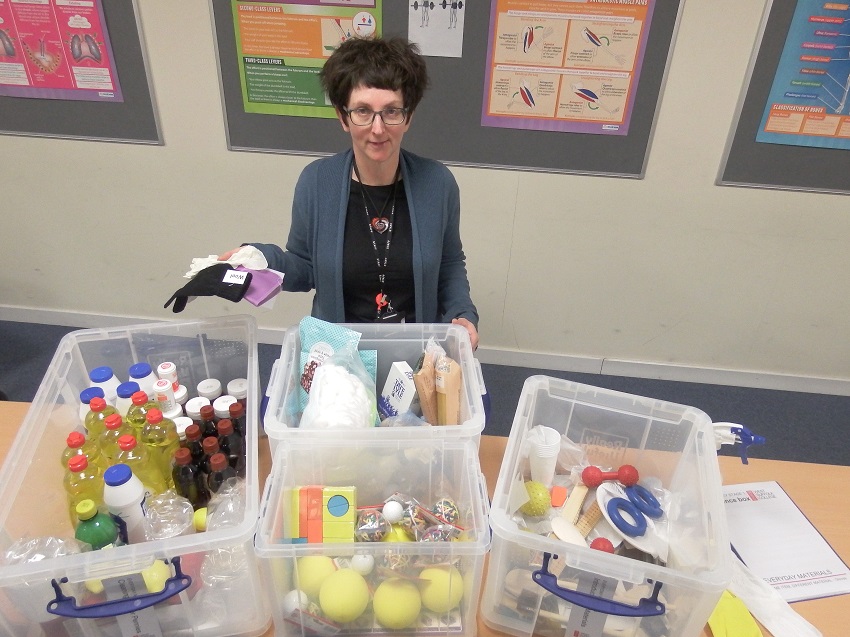An exciting innovative project for five to seven year olds, which sees them getting immersed in real science activities involving ketchup, marshmallows, spaghetti and water spray, has just been launched in Suffolk primary schools with plans to expand across East Anglia.
In a unique collaboration the pilot scheme, which already involves collaboration with 19 schools across Suffolk, is being run by West Suffolk College and sponsored by Forest Heath District Council and St Edmundsbury Borough Council.
The Schools Science Project is the brainchild of college principal Dr Nikos Savvas and involves different science activities for young pupils to carry out in a very hands-on way during their science lessons. Each big box includes a single lesson with the components for each scientific activity included – all easy to get household items – plus worksheets for the pupils to fill in before and after the activity.
The five boxes include;
*An Introduction to materials; using wood, plastic, paper, metal, fabric, rubber and stone
*Gloves; showing the same item in different materials with different uses;
*Cleaning Pennies with 5 different liquids predicting, then seeing, which works best.
*Changing Shape; finding how solid objects may change shape if squashed, bent, twisted or stretched.
*Building a Model House from marshmallows, sugar cubes and spaghetti and predict which will be waterproof when they are sprayed at the end.
The Project is being run by Victoria Fiebelkorn, Schools Science Coordinator, based at West Suffolk College. She is passionate about science and explained; “The idea is to introduce them to the excitement of science at a very early age. Picasso said: “All children are born artists; the problem is to remain an artist as we grow up.” I would say the same for Science, from a very young age we can see babies testing and evaluating the world around them - that’s science.”
Victoria’s own children have been hunting fossils since they could walk and delivering lambs before they started school. They experiment with everything from serious biology - learning to dress game and name the organs before they could read; applied physics - what happens when you apply a stone to the dining room window, at speed!; behavioural psychology - training their donkeys to come in the house, and kitchen chemistry - using bicarbonate of soda in place of flour to bake a bigger cake.
The project is also great news for the teachers Continuing Professional Development (CPD). Angela Smith, Executive Director Learner Partnerships at West Suffolk College said; “We feel passionately about Science in Primary schools and want to support the teachers who are delivering this vital part of the curriculum, so as part of our science box project we are running CPD sessions focusing on science knowledge and confidence in the classroom. We believe this will bring even more impact to the children carrying out the experiments in the Boxes.”
St Edmundsbury Borough Councillor Alaric Pugh, Cabinet Member for Planning and Growth, said: “West Suffolk is in between Cambridge and Norwich, two scientific capitals of the UK, with world beating research and design on our doorstep. To make sure our youngsters have the best chance in the future to benefit from this and maybe grow their own companies here or even find a cure for deadly diseases we think it’s right to support the teaching of STEM subjects in West Suffolk. Research has shown that schools cannot always afford the equipment needed or have the required skills. That is why we are investing in our youngsters’ and West Suffolk’s future by funding scientific boxes and training to be used in local primary schools to give them the best possible start. This is part of our work as councils to deliver more than just high quality services but support and invest in new initiatives that will grow our economy and make a real difference in people’s lives.”
Forest Heath District Councillor Lance Stanbury, Cabinet Member for Planning and Growth, “This is a great initiative between us, St Edmundsbury and West Suffolk College supporting local schools to deliver STEM subjects. This is part of West Suffolk Councils investing in our communities and future to help step in where we can to drive real benefits. Not only are the boxes useful in teaching and inspiring the scientists of the future but the training can be used by teachers to help other students coming through. On average this would cost a school at least £5,000 for the boxes alone which many find hard to afford. West Suffolk benefits from having or being close to top academic and business organisations that rely on STEM subjects and it is only right that our youngsters should be helped to take advantage of that. This is an innovative scheme from West Suffolk College and we hope to see it expand.”
Dr Savvas, who is a physicist, said the college wanted to support primary schools to enhance their scientific education. The Science Project brought together the schools, sponsors and the college in a very supportive way. The next step is to expand the projects so that more schools and pupils can benefit.



